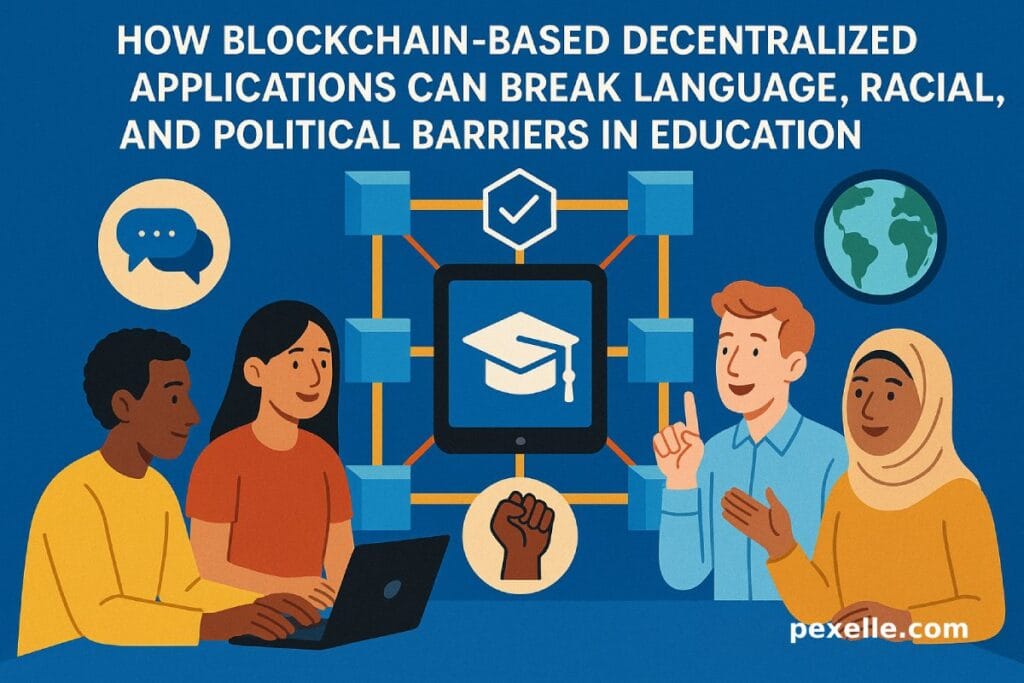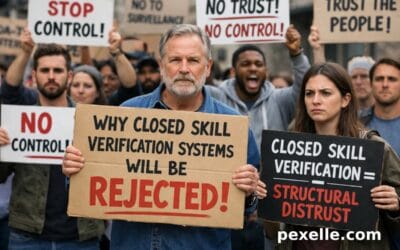How Blockchain-Based Decentralized Applications Can Break Language, Racial, and Political Barriers in Education

🌍 Introduction: Education in a Divided World
In an increasingly globalized world, education remains a fundamental right and a pathway to empowerment. Yet, countless learners around the world are held back by systemic barriers—language limitations, racial discrimination, and political censorship. Centralized platforms, often governed by institutional gatekeepers or national policies, inadvertently (or intentionally) exclude marginalized communities. Decentralized applications (dApps) built on blockchain technology present a revolutionary shift in how education can be accessed, owned, and trusted across borders.
🔐 Trustless Systems: Removing Political Gatekeeping
In many authoritarian regimes or politically unstable regions, access to uncensored educational content is severely restricted. Centralized educational platforms may be forced to comply with local laws that ban specific subjects, historical facts, or even entire languages. dApps circumvent these constraints by removing single points of control. Educational content hosted on decentralized storage systems like IPFS or Arweave, and accessed via blockchain-based frontends, cannot be easily taken down or censored. Learners can bypass firewalls and political interference, ensuring that truth and knowledge remain universally accessible.
🧩 Multilingual Smart Contracts: Bridging Language Gaps
Language remains a critical obstacle in global education. Traditional platforms often cater to dominant languages, leaving minority language speakers behind. With blockchain-based dApps, it’s possible to build multilingual learning environments that integrate AI-driven translation, NFT-based language rights, and community-driven content creation. Smart contracts can even reward contributors for translating or localizing educational material, creating a decentralized incentive system for linguistic inclusivity. This turns learners and educators into collaborators in a global knowledge ecosystem.
🧑🏽🤝🧑🏿 Identity Without Prejudice: Redefining Merit
Blockchain offers decentralized digital identity (DID) systems that prioritize skill and contribution over race, nationality, or background. Unlike traditional credentials, which are often issued based on political or institutional affiliations, blockchain-verified micro-credentials and badges can be earned by anyone, anywhere, based on real performance. These credentials are tamper-proof, transparent, and portable, allowing learners in marginalized or stateless communities to build legitimate portfolios without being subjected to discrimination. Platforms like OpenBadges, Ethereum-based identity networks, and Soulbound Tokens (SBTs) are pioneering this shift.
💰 Tokenized Incentives: Empowering the Marginalized
Economic inequality is another factor that limits educational access. Blockchain enables token-based economies that can fund education through peer-to-peer donations, DAOs (Decentralized Autonomous Organizations), and learn-to-earn models. For instance, learners can earn tokens by completing courses, contributing to discussions, or mentoring others. These tokens can then be used to unlock more advanced content or pay for certifications, creating a self-sustaining, inclusive educational economy that supports the underserved. Platforms like Gitcoin, LearnWeb3 DAO, and Bankless Academy exemplify this approach.
🧠 Case Study: Borderless Classrooms in Practice
Projects like BitDegree, Free4All Education DAO, and Khan Academy on Web3 are already experimenting with decentralized, open-access learning models. In Africa and Latin America, educators are using dApps to deliver STEM content without internet censorship, while in refugee communities, Web3 platforms allow students to rebuild academic records that were lost due to war or displacement. These examples highlight how trustless, transparent, and tamper-proof education systems can reshape the learning landscape for good.
🔮 Conclusion: A Future Beyond Borders
The convergence of blockchain, AI, and decentralized protocols is not merely a technical evolution—it is a human rights movement. By breaking down the barriers of language, race, and politics, blockchain-based dApps offer a truly democratic approach to education—one where knowledge is permissionless, access is borderless, and opportunity is universal. As we move into a future of Web3-enabled learning, it is essential that developers, educators, and policymakers work together to ensure that these technologies remain open, ethical, and inclusive.
Source : Medium.com




